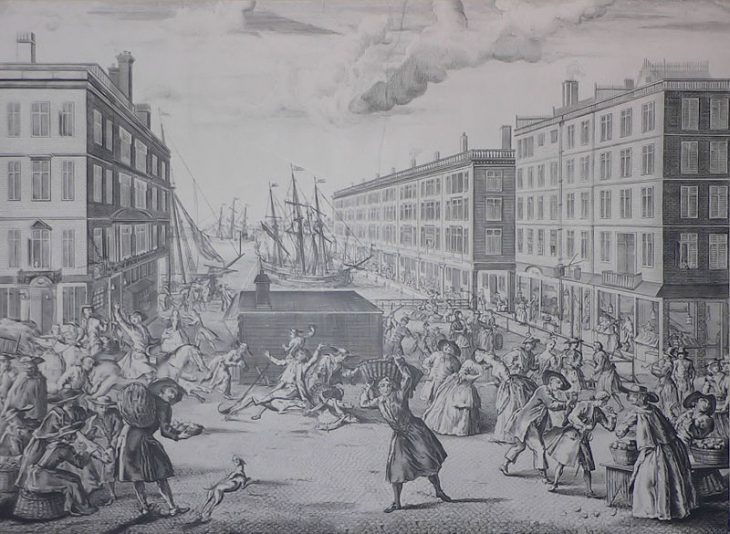
Billingsgate
The Mirriam-Webster Word of the Day for this Sunday is billingsgate. It defines the word as “coarsely abusive language.” The website says the following: “From its beginnings during the time of the Roman occupation, the Billingsgate fish market in London, England, has been notorious for the crude language that has resounded through its stalls. In fact, the fish merchants of Billingsgate were so famous for their swearing centuries ago that their feats of vulgar language were recorded in British chronicler Raphael Holinshed’s 1577 account of King Leir…. In Holinshed’s volume, a messenger’s language is said to be “as bad a tongue … as any oyster-wife at Billingsgate hath.” By the middle of the 17th century, billingsgate had become a byword for foul language.”
According to www.etymonline.com, “The place name is Old English Billingesgate, “gate of (a man called) Billing;” the “gate” probably being a gap in the Roman river wall. The market is from mid-13c.; it was not exclusively a fish market until late 17c.” It also quotes an old dictionary: “Billingsgate is the market where the fishwomen assemble to purchase fish; and where, in their dealings and disputes they are somewhat apt to leave decency and good manners a little on the left hand. [Grose, “A Classical Dictionary of the Vulgar Tongue,” 1788].”
What exactly is a bad word? I know that any of you can probably think of a dozen or more without much effort, but what is it that makes such words “bad.” Let’s take a look at some synonyms to see if they give us a clue. One is profanity, which comes from the adjective profane, which means “characterized by irreverence or contempt for God or sacred principles or things” (www.dictionary.com/browse/profane?s=t). But I think we know that not all bad words are specifically religious, or at least not anymore now that the religious and secular worlds are so separate in our culture. Another synonym is curse, which means “the expression of a wish that misfortune, evil, doom, etc., befall a person, group, etc.” (https://www.dictionary.com/browse/curse?s=t). But very few of us in the modern world believe in such curses, just as we no longer believe in witches. Of course, some people simplify the pronunciation to cuss, but it means the same thing.
Another synonym is swear, which is a verb meaning “to make a solemn declaration or affirmation by some sacred being or object.” So the notion of profanity is introduced again into what makes a bad word. Another synonym is vulgarity, from the adjective vulgar, meaning “characterized by ignorance of or lack of good breeding or taste” (https://www.dictionary.com/browse/vulgar?s=t). Some synonyms for vulgar include indecent, obscence, and lewd. And with lewd we get to the crux of the matter.
Lewd comes from the Old English word lawede: “Middle English leued, from Old English læwede ‘nonclerical, unlearned,’ of uncertain origin but according to OED probably ultimately from Vulgar Latin *laigo-, from Late Latin laicus ‘belonging to the people.’” The word lay, as in a lay person at church, comes from the same source. So bad words are the words used by the ignorant, the unlearned, and ultimately the lower classes.
There are no words which are inherently bad. There are words that refer to bodily functions, some of which are learned, meaning that they have a Latin root or come from a Romance language or are used by scientists or churchmen, and some of which are used by common people, and it is the latter which are considered lewd. There are words that refer to a person’s character or upbringing, some of which are used by the upper classes, and some of which are used by the common people, and it is the latter which are considered bad words. It is not the words that are bad or good but the cultural associations those words have. Some people say that gender is a cultural construction, but the notion that some words are acceptable and some words are bad is definitely a cultural construction.
What makes your language good or bad is not the words you choose to use but rather how you use them, the intent with which you use them. If you intend to slander someone by accusing them of things of which they are not guilty, it really does not matter what specific words you use—all your words are bad. And it makes no difference whether you are highly educated like, say, a university president or provost, or a fishwife from Billingsgate.
This view by Arnold van Haecken depicts Billingsgate in 1736. It captures the everyday market bustle: featuring fishwives, sailors, porters, thieves, quack-medicine men and casual strollers.